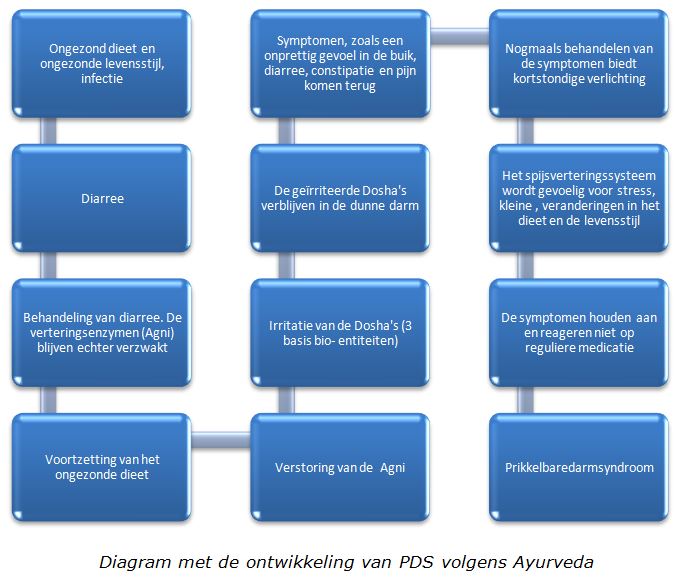Introduction

Contemporary life is accompanied by a lot of stress. The negative effects are manifested in diseases that are the result of our lifestyle. Irritable bowel syndrome (IBS) is one of. Several studies have in the past few years has shown that a large number of people are suffering from symptoms related to IBS. It is striking that the number is steadily increasing. IBS is expressed in persistent intestinal spasms, diarrhea, constipation (constipation), abdominal pain and indigestion. The condition has no direct impact on life expectancy. Yet it has a significant impact on absenteeism, reduces personal productivity, causing the depression, weakness, poor resistance and complicates the social interaction of the patient. Modern medical science has no ready-made treatment for IBS. Treatment often involves: symptom control and psychological support. Although IBS is a relatively recent disease seems to be, Causes, Symptoms and treatment already described in detail in the health teachings of Ayurveda. Not only do people feel that their complaints and spasm of the intestines lit, they also have the idea that Ayurveda quality of life improves.
The main symptoms of IBS pain and discomfort in the abdomen, which is often associated with frequent diarrhea or constipation, as well as abnormal operation of the intestines. The last symptom is often triggered by emotional or psychological stress. In addition, people with IBS suffer from intestinal spasms, the feeling of not being able to fully relieve their bowels, bloating or distention of the abdomen. In some cases, the symptoms are relieved by bowel movement. More than others, people with IBS suffer from heartburn (reflux), symptoms that are related to the urogenital system, chronic fatigue syndrome (CFS), headache, back pain and psychiatric symptoms such as depression and anxiety.
Some studies indicate that up to 60% of IBS patients suffering from psychological disorders, often anxiety or depression. Mainstream medicine today does not explain the exact cause of IBS. Nor is there a specific way of diagnosis available. Infections and food allergies are often identified as the culprits. In the chapter 'Grahani of the Ayurvedic scriptures Ayurveda offers an alternative explanation for the disease. The Ayurvedic approach to PDS will be described in the following paragraphs.
The Ayurvedic approach to IBS
The most important texts of Ayurveda are the Charaka Samhita and Sushruta Samhita. In these writings, the disease 'Grahani' described, a disease that mainly in specifically defined symptoms: irregular bowel function, diarrhea, constipation and abdominal pain. Grahani is described in a number of ways, but includes all that is meant by the irritable bowel syndrome (IBS). The following texts provide an explanation for the causes and symptoms of Grahani, PDS which is part of Grahani. Strictly speaking, the Grahani the part of the small intestine that holds food after he has taken a bit to itself. So our food gets a chance to be our digestion (Agni) in Grahani included. Once the food consumed locally is, drops further.
'Agni' is our digestive system. It is associated with different functions, such as the incorporation of enzymes, healthy contraction of the intestines, the right bacteria and normal absorption of nutrients through the intestinal wall. According to Ayurveda, there are thirteen different types of Agni. There are specific supplements for the treatment of specific disorders of the Agni. A malfunction of this Agni, or digestive enzymes, is expressed in a number of symptoms. These symptoms are a sick 'Grahani' called. In such a case, the main cause of Grahani or PDS to a malfunction of the digestive enzymes and related processes (together called 'Agni'). The causes of Grahani are explained in the following sections.
Common causes of Grahani (IBS)
"Prevention is better than cure '. Therefore it is useful to also look at the causes for the treatment of IBS. All what the Agni (digestive enzymes) weakens, is a direct cause of the emergence of Grahani (PDS). Prolonged causes include irregular eating habits, excessive intake of difficult to digest foods, food intake which one is allergic to, too few nutrients, against, overeating, eating at irregular intervals, too much effort, the cessation of the natural urge of urination, unburden, hunger, thirst, regurgitation, excessively sexually active, The contents of intestinal gas and the excessive consumption of spicy junk food. Also, excessive eating food that is very acidic, can be a cause of IBS bitter or hot (spicy) is.
The first symptoms of Grahani are caused by an imbalance of digestive enzymes, of Agni. This is followed by diarrhea, indigestion, emotional problems, stress, and so on. Diarrhea is usually treated with antibiotics, without taking into account the Agni. Once the problems have been lit, people fall back into their own eating habits. However, the Agni weakened by diarrhea and have insufficient resistance, which significantly reduces their effect. So even after the infection is successfully contested, finds digestion in a weakened state. It may not meet the continuous overload of an unhealthy lifestyle, which eventually leads to Grahani. The following flow chart shows how disease develops.

General symptoms of Grahani
Continuous: in people who are suffering from or Grahani IBS one or a combination of the following symptoms manifested, abnormal, loose stools - one must go to the toilet several times. Sometimes the stool improves spontaneously, Sometimes the patient becomes clogged (constipation). exists irritable bowel. The stool is also sometimes painful. Apart from these main symptoms Grahani is also accompanied by additional symptoms. These include excessive thirst, anorexia, salivation, water accumulation in the extremities (edema), joint pains, fever, regurgitation with an unpleasant odor, heartburn, and in some cases even vomiting.
Classification of Grahani
There are various forms of Grahani whichever Dosha dominates (the three lichaamsdosha's / bio-entities that contribute to the body). These are the Vataja, Pittaja I Kaphaja Grahani. In addition, the category is also determined by the extent to which food is digested. Grahani example Sama (incompletely digested) are, but Pakwa (digested). The symptoms of Pakwa Grahani are described under 'general symptoms'. Classifisering The remaining of the patient is as follows: A person may have the typical form of Grahani or two or more forms of the same time Grahani.
As Grahani
The Grahani caused by indigestion Dosha is called Sama Grahani. The main symptoms are a history of Aama disorders, repeated constipation, salivation, stomach ache, burning, anorexia, a heavy feeling in the stomach and the rest of the body, slimy or greasy secretions in the stool, painful cramps while defecating (Tenesmus). The diagnosis and Sama Pakwa requires very deep knowledge of Ayurveda.
Growers Grahani
Excessive thirst, dry throat, pain in the heart area, alteration of the taste sensation, weight loss, flatulence several hours after meals, unbound stools and a tendency to take even after persistent indigestion more food to themselves. Vataja Grahani is sometimes associated with asthma or recurrent hoestbuien.
Pittaja Grahani
Yellowish or bluish feces, unpleasant smelling burps, acid regurgitation, anorexia, burning sensation in the heart- and throat region. Yellowing of the skin in some chronic cases.
Kaphaja Grahani
Slow digestion, slimy stools, nausea, vomit, anorexia, a strange sensation in the mouth, sweetish taste in the mouth. Kaphaja Grahani is sometimes associated with rhinitis and the common cold.
Treatment of Grahani
Treating Grahani or IBS with Ayurveda consists of three aspects: diet, behavior and supplements.
Diet
Unhealthy eating habits are the direct cause of disturbed Agni. Therefore, one should as a precaution to have a meal at regular intervals. Avoid junk foods, foods you are allergic or intolerant to, and difficult to digest foods. Everyone has a unique body condition. On this basis, Ayurveda recommends a diet to anyone that best suits him or her. For personal dietary advice based on your health, see a qualified Ayurveda practitioner. During your consultation, Ayurveda expert can also determine which nutrients can tolerate less.
To promote healing, you can follow certain disorders of the Agni diet, For example, after diarrhea, indigestion or other ailments. This diet is mentioned in Ayurveda under Sansarjana Krama '. It is a clearly structured diet plan, depending on the condition of the Agni, start with easily digestible foods in limited quantities. As Agni recover, one gets to digest scantily heavier costs. One gets so gradually to a normal diet. Moreover, the Agni get time to recuperate, making them better protection against irregularities in our daily voedingsiname over time. A number of food products that are described in Ayurveda are considered to be beneficial for the Agni. They are also found in the above-mentioned diet and are used for the therapy.
Such diets promote digestive enzymes, digestion, shot, restore normal intestinal flora and a nutrient deficiency. Even more importantly, they contribute to a regular and normal bowel movements. There are also special diets for people with IBS who are chronically constipated and defecation experienced as painful. These diets have a soothing effect on the intestines. Moreover, they regulate the Vata Dosha, which brings relief from constipation, pain and tenesmus. For a personal diet plan you can seek advice from your Ayurvedabehandelaar.
Behavior
Factors such as stress and depression can lead to initial symptoms associated with IBS or Grahani. Stress and depression disrupt namely the functioning of Agni. Adequate and regular exercise strengthens the body, is conducive to the Agni and rids the body of stress. Meditation, Yoga and Pranayama are beneficial for the mind and increase stress resistance. Ayurveda prescribes some systematic regimen for, such as seasonal lines (Ritucharya) and daily rules (Dinacharya). So as to protect themselves against diseases that are the result of a lifestyle. By altering the behavior of one PDS occurs and it also shortens the recovery period. Purification and Shodhana supplements based on Ayurveda detox your body, remove the undigested and deformed between products (metabolites) from your body, cleansing the body naturally channels and support the efficacy of supplements.
Supplements
Based on the IBS itself and the general health of the patient, Ayurveda has been in the choice of a wide range of supplements. All supplements are based on one principle: to improve digestion and Agni, improving PDS and also, thanks to a customized therapy, full restoration of the health of the patient.
An Ayurvedic therapy can be very personal: some people only need hot water, another may only have a single seasoning powder, or a combination of pills, while another may have to undergo a detox again. For best results, a herbal treatment should be an adjustment of the living alijd combined- and eating habits. A complete examination by a qualified Ayurvedic practitioner and an assessment of the Prakriti, or general health, increase the probability that the correct therapy is prescribed. One may only use Ayurvedic supplements under strict observation of a qualified Ayurvedic doctor. This is especially important because the treatment of the Agni careful observation and precise alignment of the treatment required by the patient.
A tailor-made treatment for all is the great value of Ayurveda. In Ayurvedic therapy is not the disease but the individual central. Ayurveda emphasizes on how people should avoid illness and how to cope with an unhealthy lifestyle resistance. Many Ayurvedic supplements to improve PDS have anti-microbial properties. However, these supplements are not characterized by the extent to which they are effective against micro-organisms, but rather by the fact that they bring about the healing process of patients. According to Ayurveda, a person does not healed after the pathogen from his / her body has disappeared, instead, the immune system is made dependent of Ayurvedic herbs. A course that will make the body stronger and it gives the opportunity to fight the disease, Ayurveda is more reliant upon. It is for this reason that Ayurveda is a promising therapy for many of the PDS-related disorders and other chronic symptoms.
Dr. Pranit Ambulkar MD, Ph.D. (Sch.)
Ayurveda Consultant Physician & Ayurvedic Pharmaceutist
